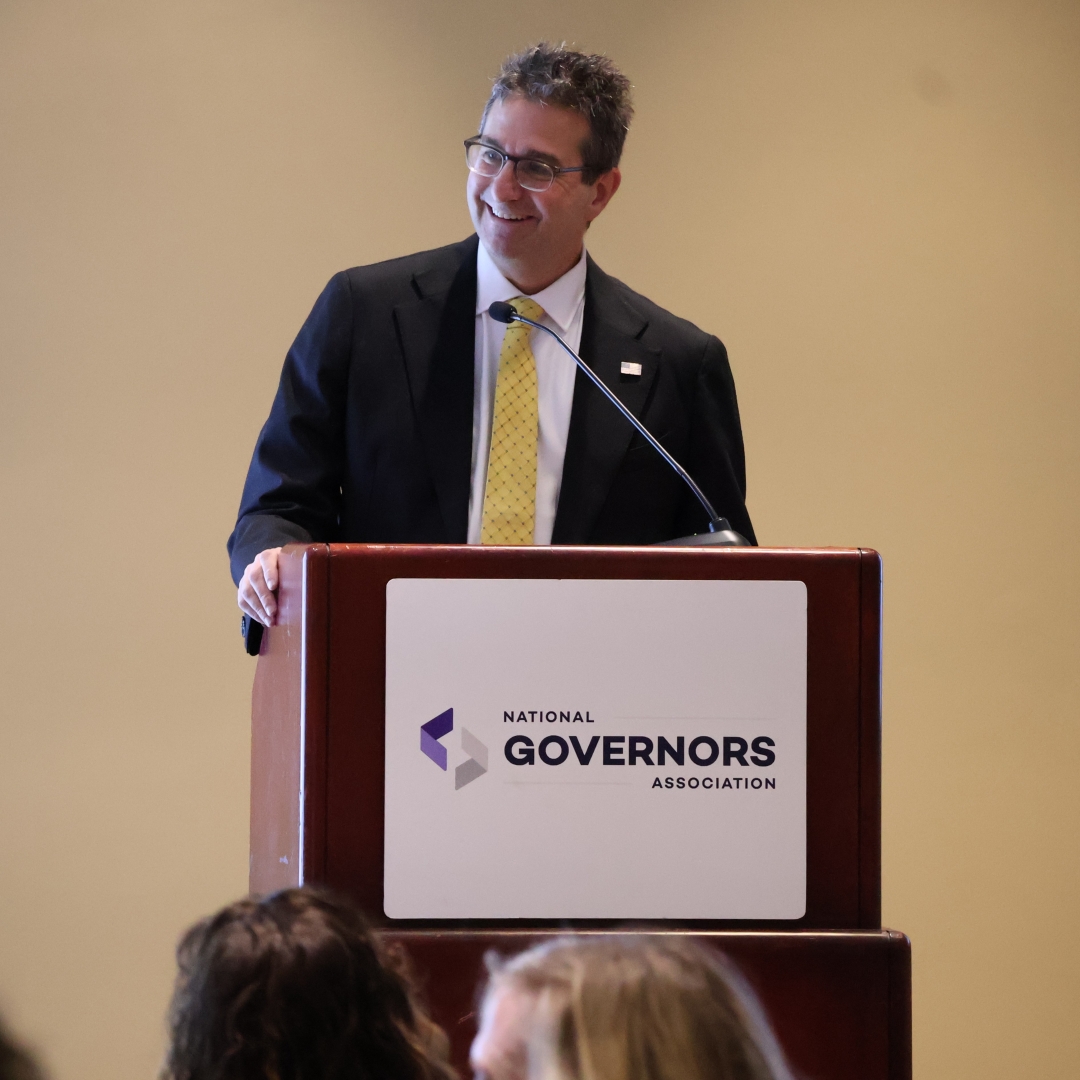How can we reshape the education system to promote economic mobility? How should we assess the value of a diploma? What role do life skills play in career success, and how do we measure them? How can we ensure states are effectively measuring the ROI of education initiatives to confirm we’re investing in what works?
After successful meetings in Salt Lake City, Denver, Las Vegas, New York and Washington, D.C., the Let’s Get Ready! initiative tackled those questions and more in a virtual convening.
NGA Chair Colorado Governor Jared Polis and Delaware Governor Matt Meyer welcomed expert panelists with deep experience exploring the educational factors driving economic mobility:
- Dr. Raj Chetty, William A. Ackman Professor of Public Economics, Harvard University
- Dr. Angela Duckworth, Rosa Lee and Egbert Chang Professor of Psychology, University of Pennsylvania
- Dr. Marguerite Roza, Director, Edunomics Lab
Opening Remarks
“When you stand in front of the classroom, you quickly learn what works and what doesn’t. You learn that success doesn’t come from top-down mandates…In Delaware, our vision for education is simple: We’re trying to put tools in the hands of teachers and school leaders. And we’re trying to develop effective measurements to measure classrooms in those schools so we really understand what’s working and what’s not.”
Governor Matt Meyer
Governor Meyer opened the meeting, sharing his background as a Teach for America participant and 4th grade teacher in Washington, D.C. He advocated for empowering teachers and developing effective metrics, highlighting Delaware’s vision of providing teachers with tools and flexibility to meet students’ needs – stressing that teachers are the key to unlocking children’s potential.
The Governor discussed the importance of developing personalized education approaches, comparing it to personalized medicine, and of education extending beyond high school into higher education and meaningful careers. He discussed the need for teaching conflict resolution, civics and financial literacy as life-skills. Governor Meyer also focused on Delaware’s efforts to attract and retain teachers in addition to overhauling the state’s school funding formula. The Governor concluded with a call to reimagine education for the next generation, noting the importance of sharing best practices, as well as “worst practices,” to allow for the collaboration and experimentation needed to make progress.
Panel Discussion
“Governors and states are in an excellent position to demand better results out of the money that we’re investing in our schools. And that’s exactly what we’re doing today. We’re going to have several experts discussing topics like: How are we measuring the value of a high school diploma? Is it individual lifetime earnings? Is it economic mobility? Is it civic disposition? Is it readiness? And, how can we better equip high school graduates with a diploma that actually means something?”
Governor Jared Polis
In opening the panel discussion, Governor Polis agreed with Governor Meyer’s idea of sharing “worst practices,” noting sometimes the most difficult thing to do is changing what isn’t working. Governor Polis stressed the importance of student achievement as a pathway to success. It’s not just about achieving knowledge for knowledge’s sake; upping the bar on student achievement means finding pathways to success—whether through high school programs, technical and community college degrees, four-year degrees or all of the above.
Dr. Raj Chetty leads Harvard’s Opportunity Insights research group, where his work is “motivated by the fact that the American dream is increasingly out of reach for many children.” Through the Collegiate Leaders in Increasing Mobility (CLIMB) Initiative, Chetty works with higher education economists, policymakers, and a diverse set of U.S. colleges and universities to understand not only which colleges act as engines of intergenerational mobility, but why. Chetty shared that research shows the strongest predictors of mobility are social connections across income levels, so policies that build cross-class interaction—such as mentorship and advising—can be just as crucial as financial investment in classrooms.
“If you think of the American dream as the aspiration that any child should have the chance to move up in the income distribution relative to their parents… our research shows there’s been a dramatic fading of the American dream… For children born in recent years, it’s become a 50-50 shot, a coin flip, as to whether you’re going to do better than your parents. There are lots of things driving that trend, but one key factor has been our ability to help people rise up through education.“
Dr. Raj Chetty
As co-founder of Character Lab, Dr. Angela Duckworth studies factors that determine success in the classroom and beyond – particularly life skills like grit, empathy, and self-control. As a social scientist, and best-selling author of Grit: The Power of Passion and Perseverance, Duckworth works to make scientific evidence behind character education actionable for parents and educators. Based on her work advising Fortune 100 companies, plus NFL and NBA teams, she emphasized the importance of life skills while breaking down just what makes character education—and its measurement—effective.
“If we are going to educate all Americans for success, it is not just language literacy, and it’s not just math literacy. Those things are very important. But… when you look at income, relationships, mental health, happiness, and physical health, it is extraordinarily clear in the research that this suite of psychological skills or character strengths are at least as important as the more traditional topics in K-12 education. And I think we’re at an exciting moment in time, because it’s also clear that there is scientific evidence about how we can equip young people better with these important skills.”
Dr. Angela Duckworth
At Georgetown University’s Edunomics lab, Dr. Marguerite Roza analyzes state data to understand which investments realize measurable value for students – and which don’t. Despite increased funding—often outpacing inflation—many schools have not seen corresponding gains in achievement – highlighting the importance of using data to evaluate return on investment. With the possibility of funding reduction in coming years, combined with enrollment declines and rising staffing costs, Roza argued for smarter spending, targeted teacher compensation (especially in critical subjects and high-need schools), and equipping school boards with the financial skills to make strategic, outcome-oriented budget decisions. Her core message: data must be actively used to guide spending, and states should hold districts accountable to ensure education dollars truly benefit students.
“You so often see a district school budget roll over and be the exact same as it was the prior year and the prior year before that, regardless of whether it worked or not… School board leaders and district leaders [should] really try to connect their budgets to their goals for students, [asking]: Did this investment work? And should we change it next year and try something else? Should we tweak it?“
Dr. Marguerite Roza
Putting it All Together
It all comes back to one of the central questions of the Let’s Get Ready! initiative: How do we identify and measure what works? Economic mobility monitoring, life skills instruction, school budget analysis, and more—it’s all just as much a part of the equation as reading and math scores. As one panelist noted, “there’s no silver bullet.”
Learn more about how Let’s Get Ready is exploring every element, and every step, of the educational journey.











